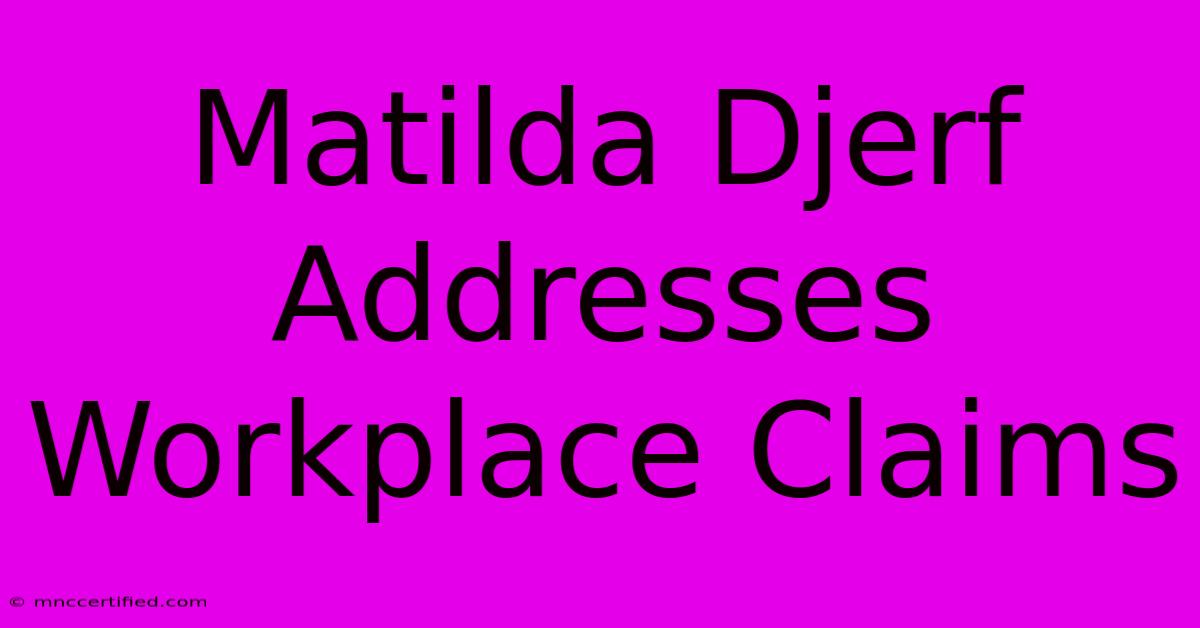Matilda Djerf Addresses Workplace Claims

Table of Contents
Matilda Djerf Addresses Workplace Claims: A Deep Dive into the Controversy
Matilda Djerf, the hugely popular Swedish influencer and entrepreneur, recently found herself at the center of a controversy involving allegations of a negative work environment within her company. This article delves into the details of the claims, Matilda Djerf's response, and the broader implications for influencers and businesses alike.
The Allegations Against Matilda Djerf's Company
Several former employees of Matilda Djerf's company, [mention company name if known], have come forward with allegations of a toxic work environment. These claims, shared primarily through anonymous accounts on social media and in articles by various publications, include accusations of:
- Overwork and unrealistic expectations: Employees reported consistently working excessive hours, often exceeding contractual obligations, with little to no overtime compensation. This alleged pressure to constantly perform, even outside of working hours, contributed to significant stress and burnout.
- Lack of support and communication: A recurring theme in the allegations is a lack of adequate support from management. Employees described feeling unsupported, unheard, and undervalued, leading to feelings of isolation and disillusionment. Insufficient communication further exacerbated these issues.
- Unprofessional conduct: Some claims pointed to instances of unprofessional behavior from management, creating a hostile and uncomfortable working environment. Specific examples, if publicly available, should be mentioned here, being mindful of legal considerations and avoiding defamation.
It's crucial to remember that these are allegations and, at this stage, unproven. Matilda Djerf has responded to these claims, and it's vital to examine her response with a critical eye.
Matilda Djerf's Response and the Public Reaction
Matilda Djerf, through [mention platform, e.g., Instagram post, official statement], addressed the allegations. Her response [summarize her response, focusing on key points and avoiding bias]. This response has been met with [describe public reaction – positive, negative, mixed, etc.]. Analyzing the public sentiment surrounding Djerf's response provides valuable insights into societal expectations regarding influencer accountability and workplace ethics.
Analyzing the Public Discourse
The public reaction to the controversy surrounding Matilda Djerf highlights several key aspects:
- The power of social media: Social media platforms played a crucial role in both disseminating the allegations and shaping public opinion. This emphasizes the importance of responsible online behavior and the potential for both positive and negative impacts of social media on business reputations.
- Demand for transparency and accountability: The controversy underscores the growing public demand for transparency and accountability from influencers and businesses. Consumers are increasingly scrutinizing brands and their practices, particularly regarding workplace ethics and employee well-being.
- The evolving influencer landscape: The incident serves as a case study in the evolution of the influencer landscape. As influencers build larger businesses, they face increasing scrutiny, requiring a greater focus on ethical conduct and responsible management practices.
Implications for Businesses and Influencers
The Matilda Djerf controversy serves as a cautionary tale for businesses and influencers alike. It highlights the critical importance of:
- Prioritizing employee well-being: Fostering a positive and supportive work environment is not merely ethically sound, but also vital for business success. Happy, engaged employees are more productive and loyal.
- Establishing clear communication channels: Open and honest communication is essential for addressing concerns and preventing misunderstandings. Regular feedback mechanisms and clear expectations can significantly improve the workplace culture.
- Implementing robust HR policies: Strong HR policies and procedures are necessary to protect employees' rights and ensure a fair and equitable workplace. This includes clear guidelines on working hours, compensation, and conflict resolution.
- Maintaining transparency and accountability: Transparency builds trust with employees and the public. Acknowledging mistakes and taking responsibility for shortcomings demonstrates integrity and builds a stronger reputation.
Conclusion: Moving Forward
The Matilda Djerf controversy is a significant event in the influencer world, raising critical questions about workplace ethics and corporate responsibility. While the details of the allegations continue to unfold, the situation underscores the need for influencers and businesses to prioritize ethical practices and foster a positive and supportive work environment. The outcome of this situation will undoubtedly influence future approaches to influencer business practices and employer-employee relations in the broader digital sphere. The ongoing discussion should encourage a more conscious and responsible approach to business within the influencer community.

Thank you for visiting our website wich cover about Matilda Djerf Addresses Workplace Claims. We hope the information provided has been useful to you. Feel free to contact us if you have any questions or need further assistance. See you next time and dont miss to bookmark.
Featured Posts
-
7 3 Quake Devastates Pacific Region
Dec 18, 2024
-
Mudryk Drug Test Failure Chelsea Responds
Dec 18, 2024
-
Keely Hodgkinson Bbc Sports Personality
Dec 18, 2024
-
Vanuatu Hit By 7 3 Magnitude Earthquake
Dec 18, 2024
-
Matilda Djerf Accused Of Psychological Terror
Dec 18, 2024